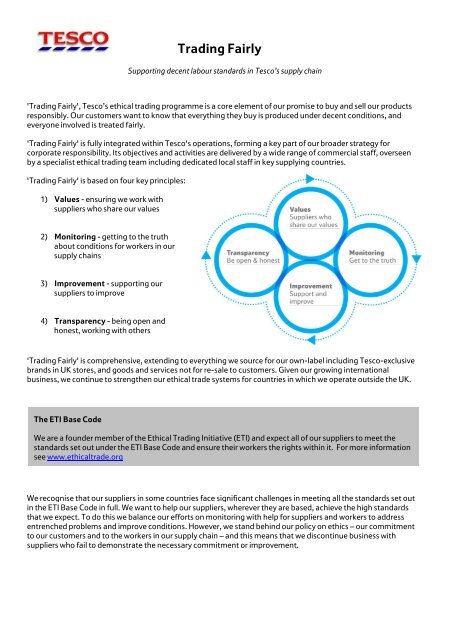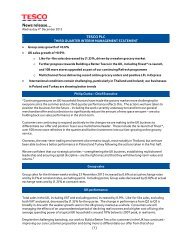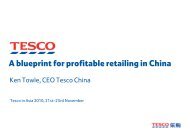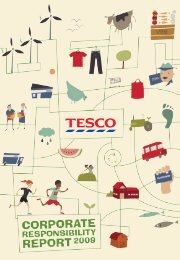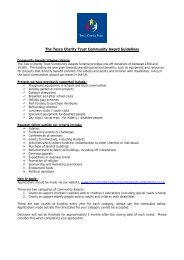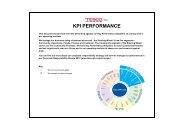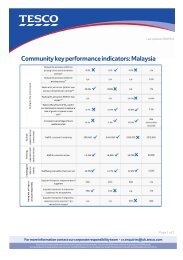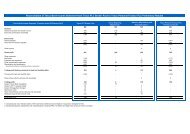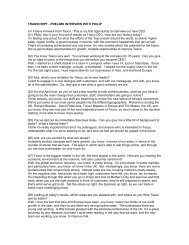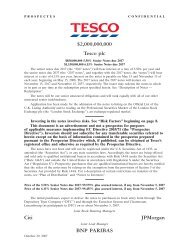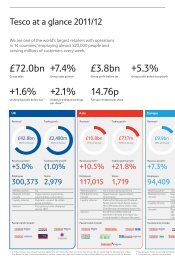Create successful ePaper yourself
Turn your PDF publications into a flip-book with our unique Google optimized e-Paper software.
'<strong>Trading</strong> <strong>Fairly</strong>', <strong>Tesco</strong>’s ethical trading programme is a core element of our promise to buy and sell our products<br />
responsibly. Our customers want to know that everything they buy is produced under decent conditions, and<br />
everyone involved is treated fairly.<br />
'<strong>Trading</strong> <strong>Fairly</strong>' is fully integrated within <strong>Tesco</strong>'s operations, forming a key part of our broader strategy for<br />
corporate responsibility. Its objectives and activities are delivered by a wide range of commercial staff, overseen<br />
by a specialist ethical trading team including dedicated local staff in key supplying countries.<br />
'<strong>Trading</strong> <strong>Fairly</strong>' is based on four key principles:<br />
1) Values - ensuring we work with<br />
suppliers who share our values<br />
2) Monitoring - getting to the truth<br />
about conditions for workers in our<br />
supply chains<br />
3) Improvement - supporting our<br />
suppliers to improve<br />
4) Transparency - being open and<br />
honest, working with others<br />
'<strong>Trading</strong> <strong>Fairly</strong>' is comprehensive, extending to everything we source for our own-label including <strong>Tesco</strong>-exclusive<br />
brands in UK stores, and goods and services not for re-sale to customers. Given our growing international<br />
business, we continue to strengthen our ethical trade systems for countries in which we operate outside the UK.<br />
The ETI Base Code<br />
<strong>Trading</strong> <strong>Fairly</strong><br />
Supporting decent labour standards in <strong>Tesco</strong>’s supply chain<br />
We are a founder member of the Ethical <strong>Trading</strong> Initiative (ETI) and expect all of our suppliers to meet the<br />
standards set out under the ETI Base Code and ensure their workers the rights within it. For more information<br />
see www.ethicaltrade.org<br />
We recognise that our suppliers in some countries face significant challenges in meeting all the standards set out<br />
in the ETI Base Code in full. We want to help our suppliers, wherever they are based, achieve the high standards<br />
that we expect. To do this we balance our efforts on monitoring with help for suppliers and workers to address<br />
entrenched problems and improve conditions. However, we stand behind our policy on ethics – our commitment<br />
to our customers and to the workers in our supply chain – and this means that we discontinue business with<br />
suppliers who fail to demonstrate the necessary commitment or improvement.
1) Values<br />
The first of the four principles of our ethical trade programme focuses on selecting suppliers who share our values<br />
and ensuring that we retain them. Our work under ‘Values’ is organised around three key themes: ‘Communicate<br />
our values’, ‘Set Strong Standards’ and ‘Approve New Suppliers’.<br />
a) Communicate our Values<br />
Our Values focus on two main areas; how we ensure we meet the needs of our customers, and how we work with<br />
others. Since the launch of our ethical trading programme in 1998, we have worked hard to ensure that these<br />
Values are reflected in all aspects of our Ethical Trade programme.<br />
An example that illustrates how we bring our Values to life is our ‘<strong>Trading</strong> <strong>Fairly</strong> Awards’. Launched in 2009 they<br />
are now open to all <strong>Tesco</strong> suppliers with winners being awarded a grant from <strong>Tesco</strong> to invest in initiatives that<br />
benefit their workers.<br />
Over the last year awards have been presented to a Brazilian fresh produce supplier for creating an exceptional<br />
place to work with permanent jobs for 100% of their workforce and to two UK Poultry suppliers for their<br />
innovative approach to diversity training and for implementing an approach for worker-management dialog that<br />
has delivered significant benefits for both their staff and the business.<br />
We also publish a quarterly ethical trading newsletter for distribution across <strong>Tesco</strong> to help bring our ethical trading<br />
programme alive for our staff.<br />
b) Set strong standards<br />
Setting, communicating and enforcing strong standards is a cornerstone of our ethical trade programme. We will<br />
only work with suppliers who share our values and can demonstrate commitment to the ETI base code.<br />
In practice we promote <strong>Tesco</strong>’s commitment to ethical trading in a number of ways throughout our business and<br />
to our suppliers:<br />
� The <strong>Tesco</strong> Protocol for managing ethical assessments is issued and briefed to all <strong>Tesco</strong> commercial<br />
personnel involved in sourcing products.<br />
� All our suppliers receive a practical, accessible <strong>Tesco</strong> Code of Practice on ethical trade so they can be clear<br />
on our programme and expectations.<br />
� All suppliers receive a ‘Supplier Starter Pack’, a user-friendly guide on our requirements and processes in<br />
relation to Ethical <strong>Trading</strong>. Supplementing the Code of Practice, it pulls together all the pertinent<br />
information into a single focused document.<br />
These standards are implemented by <strong>Tesco</strong> Buyers and Technical Managers supported by Central and in-country<br />
Ethical Trade Teams, all of whom are formally trained on and supported by robust policies and procedures<br />
covering our ethical trade practices.<br />
c) Approving new suppliers<br />
All potential new suppliers are evaluated to ensure that they understand the standards we require and have the<br />
ability to meet them. In practice this means that all new suppliers are risk-assessed before supply begins, with<br />
appropriate action being taken to resolve any serious issues prior to commencing supply. We will not work with a<br />
supplier if we identify major problems at this initial screening stage and cannot resolve them.
2) Monitoring<br />
The second pillar of our ethical trading programme is monitoring. Monitoring helps identify issues in the supply<br />
chain on which we and our suppliers must focus.<br />
a) Assessing risk<br />
All sites which supply directly to <strong>Tesco</strong> are risk-assessed in relation to ethical standards before supply begins.<br />
SEDEX (www.sedex.org.uk) is a powerful tool in this process, containing information on each supplier site across<br />
several hundred criteria ranging from geographical location and sector, to workforce gender and the proportion of<br />
temporary workers. Information from SEDEX supplemented by insights from on-going dialogue with a range of<br />
external partners including NGOs, Trade Unions and the ETI, helps us assess risk and determine supplier audit<br />
requirements.<br />
We also use formal Supply Chain Impact Assessments and regular visits by our own staff to better understand the<br />
broader context of the challenges our suppliers and their workers face.<br />
b) Audit and report accurately<br />
Sites are monitored according to their risk rating. High-risk supplier sites are subject to annual independent<br />
ethical audits, medium risk sites are audited once every two years, and low-risk sites are required to review their<br />
self-assessments every six months.<br />
Ethical audits are conducted in accordance with SMETA (SEDEX Members Ethical Trade Audit) guidelines.<br />
SMETA, a SEDEX initiative, helps consumer brands and their suppliers reduce duplication and ensure better<br />
quality auditing by setting out a robust methodology and a common format for the audit report and its<br />
corresponding corrective action plan.<br />
Audits are conducted by teams who are recognised as competent to audit and interview workers in their own<br />
languages. The size and composition of the audit team and duration of the audit are tailored to the supplier/site,<br />
and reflect the gender profile of the workforce and the main languages spoken.<br />
During the closing meeting all non-compliances are discussed and a Corrective Action Plan Report (CAPR) agreed<br />
between the Supplier and the audit company. If any critical non-compliances are found, the Audit Company will<br />
notify <strong>Tesco</strong> directly. They will also inform <strong>Tesco</strong> of any issues that the supplier refused to acknowledge or that<br />
could not be verified. Any attempt to pervert the course of the audit through fraud, coercion, deception or<br />
interference is treated as a critical non-compliance and reported to <strong>Tesco</strong>.<br />
Following the audit suppliers are required to resolve all corrective actions identified in the audit report, addressing<br />
non-compliances with the ETI Base Code and local law. The supplier is responsible for completing all corrective<br />
actions on the CAPR within agreed timescales, and for obtaining verification of closure from the independent<br />
auditors — normally within six months. The whole process — from planning through supplier completion to final<br />
auditor verification — is tracked through SEDEX, enabling our Commercial teams to have real-time oversight of<br />
progress and take action where necessary.<br />
Together with Correct Breaches, these steps form the core monitoring and improvement programme for ethical<br />
trade at <strong>Tesco</strong>.<br />
c) Announced and semi-announced audits<br />
Announcing the date of audits to suppliers in advance helps ensure that all necessary records are present for<br />
inspection during the audit, and helps build ownership of ethical issues by the supplier’s management team. This<br />
practice does however present an opportunity for some suppliers to prepare sites and coach workers prior to an<br />
audit in an attempt to manipulate findings.
To address this risk we operate ‘semi-announced’ audits for all high risk sites supplying our UK Business, a process<br />
where suppliers are given a one-month window during which the audit will take place as opposed to an exact date.<br />
This ensures that the relevant records are present on site, but that there is less chance for advance preparation.<br />
In parallel unannounced audits of sites across a range of risk profiles allow us to cross-check our main audit<br />
findings, and validate our broader audit and risk assessment process.<br />
In some cases the unannounced audits re-confirmed the findings of earlier announced or semi-announced audits,<br />
whereas in other instances additional issues were identified which were then subject to the normal improvement<br />
process.<br />
d) Auditor Recognition Programme<br />
Maintaining the quality of audits across our supply chain is vital in ensuring we identify the issues and support our<br />
suppliers in addressing them. A key element of this is our Auditor Recognition Programme (ARP) under which a<br />
tight group of specific audit bodies, schemes and individual auditors are recognised and approved to audit sites<br />
supplying <strong>Tesco</strong>.<br />
Their on-going performance is monitored through a process of quarterly reviews, including complaint<br />
investigations and shadow audits.<br />
As part of our commitment to share best-practice and support the convergence of Retailers' differing approaches<br />
to ethical trade, we have made the full details of our ARP publicly available. As a further measure of transparency,<br />
we also publish a full list of the independent companies that employ the individual auditors we have vetted and<br />
recognised, along with the countries in which we have approved them to audit.<br />
e) Understand Workers<br />
Gathering information through workers about workplace concerns is a powerful adjunct to intelligence gathered<br />
through other routes including 3rd-party audits, participatory interviews and links with local stakeholders on the<br />
ground. Recognising the importance of good workplace communication and the benefits of resolving workers<br />
concerns before they escalate, we have worked with South African partners, Harvard University and the UN<br />
Special Representative on Business and Human Rights to pilot principles which could underpin a robust and<br />
effective grievance mechanism. This pilot has seen business, Government, NGOs and Trade Unions work together<br />
as part of the project’s Oversight Stakeholder Body.<br />
We piloted a farm-level grievance mechanism which gave over 3,000 workers the opportunity to voice their<br />
concerns and know that these concerns will be listened to and acted upon.<br />
This work has also supported wider learning. In March 2011 the UN Special Representative on Business and<br />
Human Rights, Professor John Ruggie, presented a new global framework on the duties of states and companies<br />
for human rights. This framework included guidance on grievance mechanisms that have been tested against,<br />
and refined in the light of, <strong>Tesco</strong>’s South Africa pilot and pilots with three other companies globally.<br />
f) Response to allegations<br />
In addition to reports by independent auditors and visits from our own staff, breaches of the ETI Base Code — or<br />
related concerns — can also be reported by suppliers themselves, workers, NGOs and trade unions. We<br />
investigate any such reports immediately and are happy to provide confidentiality for complainants where<br />
requested.<br />
In addition, our expanding team of in-country ethical trade managers is increasing our ability to find out about<br />
local concerns, through dialogue with a range of stakeholders. They will investigate any issues of concern.
Internally we also provide a dedicated, confidential helpline for any staff concerned about ethical trade issues —<br />
whether about the actions of <strong>Tesco</strong> staff in their relationships with suppliers, or events at one of our supplier’s<br />
workplaces — and investigate any reports.<br />
g) Identify trends<br />
The identification of trends is an important element of ensuring we focus our resources towards areas which<br />
present the greatest risk in terms of code compliance, and where our efforts can achieve the greatest leverage,<br />
delivering the best results.<br />
Given the dynamic nature of supply chains and the impact of socio-economic, political and environmental<br />
impacts on labour standards in our supply base and associated local communities, our programme is subject to<br />
regular review to ensure its focus remains appropriate.<br />
3) Improvement<br />
The third of the four pillars of our ethical trade programme focuses on Improvement. Our work under this pillar is<br />
important as the process of monitoring does not by itself drive improvement that is sustainable in the longer term,<br />
only serving to flag up issues that require further focus and attention.<br />
a) Correct Breaches<br />
We require all breaches of the ETI Base Code and/or local law at our suppliers’ sites to be corrected.<br />
The method of verifying these breaches is determined by the audit company on a case-by-case basis, depending<br />
on what is needed to be confident the improvement action has been carried out. This may involve a follow-up<br />
verification audit, desktop review or full ethical audit.<br />
Following this process the <strong>Tesco</strong> Technical Manager will review the content of the auditor’s report to confirm if it is<br />
appropriate to commence supply in the case of a new supplier, or continue business in the case of an ongoing<br />
established relationship. They will also review progress against the action plan through ongoing dialogue with the<br />
supplier or during subsequent site visits.<br />
Fire and Safety in Bangladesh<br />
This is a major topic of concern in Bangladesh, where in the past industrial fires have led to a significant and<br />
tragic loss of life. While none of these events have taken place at any of our own suppliers’ sites, we recognise<br />
that such events are a risk for the whole industry in Bangladesh and that general standards of emergency<br />
evacuation, fire prevention, electrical safety and preventative maintenance need to improve substantially.<br />
Throughout the year we have participated in multi-stakeholder and collaborative buyer/industry efforts to<br />
raise awareness and improve standards, as well as conducting our own checks and factory-specific<br />
improvement plans. We have also supported the production of fire safety videos in Bengali which, when<br />
complete, will form part of compulsory training at all factories we use, along with regular emergency<br />
evacuation drills.<br />
b) Build Long, strong relationships<br />
We know that our best supplier partners tend to be well run, profitable enterprises with strongly embedded<br />
practices that respect and engage their workforce. Recognising this fact, we have invested significant effort in<br />
engaging with suppliers in key regions through audit and training to help them improve their management<br />
capacity, capability and productivity, delivering commercial benefits which support their continued investment in<br />
improving their businesses.
Each year we conduct training sessions for our suppliers on how best to address common non-compliances,<br />
improve communications between workers and management, home working, contract labour, purchasing<br />
practices and productivity.<br />
c) Develop Skills<br />
� Supplier Training is an important element of <strong>Tesco</strong>’s Ethical Trade Strategy. It is delivered in-country<br />
direct to groups of suppliers by <strong>Tesco</strong> Ethical <strong>Trading</strong> Managers supplemented where necessary by<br />
external subject matter experts. Wherever possible, <strong>Tesco</strong> Commercial and Technical staff are also in<br />
attendance so that any questions relating to the more general business and its impact on Ethical <strong>Trading</strong><br />
can be answered. A one-day workshop format is used to communicate <strong>Tesco</strong>’s expectations and includes<br />
a focus on specific challenges relevant to the suppliers attending, covering issues such as migrant labour<br />
or working hours.<br />
These sessions also provide an opportunity for Suppliers to feedback views on a confidential basis in the<br />
absence of <strong>Tesco</strong> personnel under the ‘Do more, do less, do different’ programme. Supplier feedback is<br />
collated and anonymised before being fed back to <strong>Tesco</strong>, and is a useful adjunct to our annual strategic<br />
review.<br />
� Training UK agents are often the primary interface between <strong>Tesco</strong> and many overseas suppliers, and as<br />
such it is important that they are properly equipped to discharge their responsibilities on behalf of the<br />
business. We run training session for our UK-based agents to build their knowledge on our ethical trade<br />
requirements.<br />
� The training of <strong>Tesco</strong> staff in Ethical <strong>Trading</strong> is important in ensuring that those in operational roles with a<br />
direct supplier interface are properly equipped both to execute our Ethical Trade policy, and support<br />
suppliers in ensuring labour standards are respected. Functions currently included in training include all<br />
buying and technical staff across Food, General Merchandise, UK Corporate Purchasing and our<br />
International Business.<br />
� We have an in-house expert approved by Sedex to deliver Risk Report Training. We delivertraining to staff<br />
across the business, ensuring they are properly equipped to interrogate Sedex and effectively manage all<br />
ethical aspects of new and ongoing supplier relationships.<br />
� Ethical Champions are also important in embedding ethical trade knowledge, practices and decision<br />
making within commercial teams. During 2010 we launched a new programme of ‘Witness Audits’<br />
offering an opportunity for Ethical Champions to accompany semi-announced ethical audits of UK<br />
suppliers.<br />
d) Preferred Supplier Schemes: ‘Gold / Silver / Bronze’ suppliers<br />
Our ‘Preferred Supplier Scheme’ has proven successful in motivating suppliers to focus on our ethical<br />
requirements, whilst providing our Buying Teams with the tools they need to support and develop relationships<br />
with suppliers that are committed to meeting the standards we expect.<br />
Good ethical performance is a pre-requisite to be considered for ‚Gold‛ status, along with consistent product<br />
quality and reliability. Gold suppliers agree three-year projections with <strong>Tesco</strong> to enable them to plan their<br />
businesses, labour needs and plans for employee remuneration more effectively over the long-term, and benefit<br />
from higher volumes of trade. For suppliers who continue to underperform, the same process is used to reduce<br />
levels of business, or in certain cases terminate business.
4) Transparency<br />
The final pillar of our ethical trading programme is transparency. This is essential both to maintain customer and<br />
stakeholder confidence in our work, and to enable effective collaboration and convergence with other retailers,<br />
suppliers and civil society.<br />
a) ‘Work with others and Build Awareness’<br />
As a significant player in the multiple retail sector, we seek to use our size as a force for good. A fundamental aim<br />
of our strategy on ethical trading is to drive convergence of international approaches to monitoring and<br />
remediation which otherwise remain fragmented, resulting in unnecessary duplication and wasted effort for both<br />
retailers, suppliers and other stakeholders. We seek to achieve this through the most appropriate formal and<br />
informal groupings, supporting those which are most likely to drive and deliver sustained improvement in<br />
approaches and working conditions.<br />
We are an active participant in a range of different ethical trade fora, both in the UK and Internationally.<br />
In the UK we work closely with the ETI Food Group, ETI General Merchandise Group, The Gangmasters Licensing<br />
Authority (GLA), and the Equality and Human Rights Commission. We continue to play a leading role in the<br />
development of Supplier Ethical Data Exchange (SEDEX), having contributed to the development of a revised<br />
Self-Assessment Questionnaire.<br />
At an international level we continued our work with the GSCP (Global Social Compliance Programme), a work<br />
stream of the Consumer Goods Forum, aimed to driving convergence on best-practice on Ethical Trade across<br />
international supply chains.<br />
At a local level we work closely with both sector and country-specific fora through in-country Ethical Trade<br />
Managers embedded within our local sourcing hubs. Based in key supply countries where suppliers and workers<br />
face significant and persistent challenges in meeting the ETI Base Code, their role is to work closely with our<br />
supply chain to understand the challenges and identify what assistance and resources will be needed to support<br />
sustained improvement in conditions for workers.<br />
In addition to helping co-ordinate our interface with key in-country initiatives, our local Ethical Trade Managers<br />
help support suppliers facing entrenched problems develop robust and sustainable solutions, either on an<br />
individual basis or through collaborative sector or issue-specific groups.<br />
In the Indian sub-continent and supported by our local Ethical Trade Manager, we have worked closely with The<br />
National Home workers Group, the Bangladesh Buyers Forum, the Indian Brands Ethics Working Group, the<br />
Apparel Exporter Promotion Council and SEWA (the Self-Employed Women’s Association).<br />
Through our local Ethical Trade Manager in South Africa we have established an Ethical Steering group with<br />
membership drawn from key exporters, audit bodies and industry associations. It meets on a monthly basis to<br />
review discuss and inform <strong>Tesco</strong>’s Ethical Trade strategy in South Africa.<br />
b) Public reporting<br />
Each year <strong>Tesco</strong> provides an update on its ethical trade programme as part of its broader Corporate Responsibility<br />
Report a condensed version of our more detailed report for the Ethical <strong>Trading</strong> Initiative.<br />
c) Supplier transparency<br />
All suppliers to <strong>Tesco</strong> are required to be transparent about their ethical trade status and performance. This begins<br />
with the requirement to register full details of their workforce, sector, gender balance and other issues on the<br />
Supplier Ethical Data Exchange (SEDEX), and continues with the requirement for all ethical audits and records of<br />
remediation to be loaded on to SEDEX where they can be viewed by any retailer sourcing from that supplier.
Our ethical trading training courses for suppliers are designed to enable them to share the challenges they face<br />
and examples of good practice in finding solutions. By way of example, our Workshops with UK food and<br />
agriculture suppliers and their agency labour providers enabled suppliers to compare notes on common problems<br />
and talk about what has worked well in addressing them. We support this process with our own knowledge and<br />
with the input of our expert presenters, many of them external.<br />
We also run more general supplier conferences across different categories and countries in which we operate.<br />
These frequently cover ethical trade priorities, and enable both suppliers and <strong>Tesco</strong> staff to discuss challenges and<br />
potential solutions.<br />
The future<br />
In the years ahead we will continue to further develop and refocus our ethical trading programme, targeting our<br />
support for suppliers facing challenges to improve using intelligence gathered through Sedex and our global<br />
dialogue with key stakeholder groups.<br />
We will continue to develop and implement tailored strategies to address some of the most entrenched<br />
challenges our suppliers face, with particular focus on how best to improve productivity and wages in parts of<br />
South Asia, and strengthen worker representation as a means to improve conditions across the range of labour<br />
standards challenges.


